

This is done preferably beginning with dusk on the evening of the 14th day of the Hebrew month of Nissan, which is the evening before the first Seder. Those years in which the first Seder falls on a Saturday night, the Bedikah (searching) must be conducted Thursday night.
Customarily we search by light of a candle or flashlight and use a feather to sweep up the chametz into a paper bag; put out a known number of bread pieces, each on a napkin, one piece in every room.
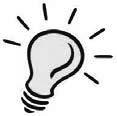
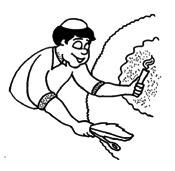
Before one begins the search recite this blessing:
We praise You, Eternal God, Sovereign of the universe, who has sanctified us with Your commandments and commanded us removing all chametz.
Baruch atah Adonai, Eloheinu melech ha-olam, asher kid'shanu b'mitzvotav v'tzivanu al biyur chametz.
After the search, recite the following formula which annuls all chametz crumbs not found and save the bag for burning the next morning:
All the sourdough and chametz in my possession that I have not seen and not eradicated is hereby nullified and made like the dust of the earth.
Kol chamira vachami-ah d'ika virshuti d'la chamiteih ud'la vi-arteih ud'la y'dana leih libateil v'lehevei hefkeir k'afra d'ara.
Most often, a holy book unfolds sequentially and organically, like a seed growing into a tree. Like a seed, the first words contain the essence of all subsequent sentences, paragraphs, and chapters, which "grow'' the holy message from seed to fully developed organism. The Haggadah is no exception. Bedikat Chametz (the search for leaven) and Biyur Chametz (the burning of leaven) capture the essence of the whole Passover process. We liberate ourselves from the Egypt of our worn-out thoughts, habits, and desires by searching out and destroying the sources of leaven of decay in our lives--internal and external. This is the essence of the Haggadah, the Seder ritual, and the eight day observance of Passover.
Rabbi Alan GreenAfter finding and placing the chametz in the paper bag, it is to be burned before 10:00 AM on the morning of the First Seder, including the feather and wooden spoon reciting the declaration on this page. Those years in which the first Seder falls on a Saturday night, the Biyur (eradication) must be conducted Friday morning but the declaration should be recited on Saturday morning:

All the leaven and chametz in my possessionwhether I have seen it or not, whether I have destroyed it or not - is to be considered null, public property, nor more than the dust of the earth.

We praise You, Eternal God, Sovereign of the universe, who has sanctified us with Your commandments and commanded us kindling the (On Shabbat add: Shabbat and) Festival lights.
Baruch atah Adonai, Eloheinu melech ha-olam, asher kid'shanu b'mitzvotav v'tzivanu lehadlik ner (On Shabbat add: shel Shabbat veshel) Yom Tov.


We praise You, Eternal God, Sovereign of the universe, who has sustained us, maintained us and enabled us to reach this moment in life.
Baruch atah Adonai, Eloheinu melech ha-olam, shehecheyanu v'ki'manu v'higi-anu laz'man hazeh.
For sons:
May God bless you like Ephraim and Menasseh.
Yesimcha Elohim k’Efraim v’chiMenasheh.

For daughters:
May God bless you like Sarah, Rebecca, Rachel and Leah.
Yesimech Elohim k’Sarah, Rivkah, Rachel v’Leah.
For everybody:
May God bless you and keep you;
May God cause His spirit to shine upon you and be gracious unto you;

May God turn His spirit unto you and grant you peace.
Yevarechecha Adonai v’yishmerecha.
Yaer Adonai panav elecha vichuneka. Yisa Adonai panav elecha veyasem lecha shalom.
The recitation of the various stages of the Seder ritual gives us a vision of the entire structure of the evening. In many Haggadot, there are fourteen stages in the Seder, corresponding to the Gematria of the word YAD (yud and dalet add up to 14). God liberated the Israelites with a YAD CHAZAKAH, “a mighty hand”. In this Haggadah, Motzi and Matzah are counted separately yielding the number 15 YAH (yud and heh add up to 15 one of the names of God). The Seder is therefore a symbol of the process of liberation from Egypt, as it took place in ancient times, as well as around our Seder tables today. Ideally, by the time we reach step 14 (or 15) , we should have succeeded in taking a giant step out of our personal Egypt, and into our own Promised Land of freedom and fulfillment. Rabbi Alan Green
Kadesh

Urchatz
Karpas
Yachatz
Maggid
Matzah
Korech
Motzi
Sanctify the name of God
Wash the hands
Eat a green vegetable
Break the middle Matzah
Tell the story of the Exodus
Wash the hands before the meal
Say the Ha-motzi
Recite the blessing for the Matzah


Maror
Shulchan orech
Eat the bitter herbs
Eat the Matzah and Maror sandwich
Tzafun
Barech
Hallel
Enjoy the festival meal
Eat the Afikoman
Say the blessing after the meal
Recite the Hallel







Conclude the Seder




On Shabbat add:
And there was evening and there was morning, the sixth day.
And the heavens and the earth and all their hosts were completed. And on the seventh day God finished the work which God had made, and God rested on the seventh day from all the work which God had made. And God blessed the seventh day and made it holy, for on it God rested from all the work which God’s created to make.
On Shabbat add:
Vay'hi erev vay'hi voker yom hashi-shi. Vay'chulu hashamayim v'ha-aretz v’choltzva-am. Vay'chal Elohim bayom hashvi-i, m'lachto asher asah, vayishbot bayom hashvi-i, mikol-mlachto asher asah. Vay'vareich Elohim, et-yom hashvi-i, vay'kadeish oto, ki vo shavat mikol-mlachto, asher-bara Elohim la-asot


Attention Everybody!:
We praise You, Eternal God, Sovereign of the universe, who creates the fruit of the vine.
Savri maranan v’rabanan v’rabotai: Baruch atah Adonai, Eloheinu melech ha-olam, borei p'ri hagafen.

On Shabbat add the shaded words:
We praise You, Eternal God, Sovereign of the universe, who has chosen us from among all people, and raised us above all tongues, and made us holy through the commandments. And You, God, our God, have given us in love (Shabbat for rest and) festivals for happiness, feasts and festive seasons for rejoicing this (Shabbat-day and the day of this) Feast of Matzot and this Festival of holy convocation, the Season of our Freedom (in love), a holy convocation, commemorating the departure from Egypt. For You have chosen us and sanctified us from all the nations, and You have given us as a heritage Your holy (Shabbat and) Festivals (in love and favor), in happiness and joy. We praise You, Eternal God, who sanctifies (the Shabbat and) Israel and the festive seasons.
Baruch atah Adonai, Eloheinu melech ha-olam, asher bachar banu mikol-am, v'rom'manu mikollashon, v'kid'shanu b'mitzvotav, vatiten-lanu

Adonai Eloheinu b'ahavah (shabatot limnuchah u) moadim l'simchah, chagim uz'manim l'sason et-yom (hashabat hazeh v'et-yom) chag hamatzot hazeh. Z'man cheiruteinu, (b'ahavah,) mikra
kodesh, zeicher litzi-at mitzrayim. Ki vanu vacharta v'otanu kidashta mikol-ha-amim.
(v'shabat) umo’adei kod’shecha (b'ahavah uv'ratzon) b'simchah uv'sason hinchaltanu.
Baruch atah Adonai, m'kadeish (hashabat v') yisra-eil v'hazmanim.
On Saturday evening, we now add the following “ Havdalah” section into the Kiddush to separate the sanctity of Sabbat from the Sanctity of the Festival of Pesach. At some Sedarim the leader will use the Yom Tov candles if nearby, while others will deliberately light a Havdalah candle from an existing light - and then recite the following blessings:
We praise You, Eternal God, Sovereign of the universe, who creates the lights of fire.
Baruch atah Adonai, Eloheinu melech ha-olam, borei m'orei ha-eish
We praise You, Eternal God, Sovereign of the universe, who makes a distinction between sacred and profane, between light and darkness, between Israel and the nations, between the seventh day and the six work-days. You have made a distinction between the holiness of the Shabbat and the holiness of the festival, and You have sanctified the seventh day above the six work-days. You have set apart and made holy Your people Israel with Your holiness. We praise You, Eternal God, who makes a distinction between holy and holy.
Baruch atah Adonai, Eloheinu melech ha-olam, hamavdil bein kodesh l'chol bein or l'choshech, bein yisraeil la-amim, bein yom hashvi-i l'sheishet y'mei hama-aseh. Bein k'dushat shabat likdushat yom tov hivdalta. V'et-yom hashvi-i misheishet y'mei hama-aseh kidashta. Hivdalta v'kidashta et-am'cha yisra-eil bikdushatecha. Baruch atah Adonai, hamavdil bein kodesh l'kodesh.
We praise You, Eternal God, Sovereign of the universe, who has sustained us, maintained us and enabled us to reach this moment in life.
Baruch atah Adonai, Eloheinu melech ha-olam, shehecheyanu v'ki'manu v'higi-anu laz'man hazeh.
“For You have chosen us and sanctified us from all the nations…” When we read these words, we should realize that we are not “holier than thou”; that the holiness of the Jewish people is not inherent, but depends upon actually behaving in a holy way. “I call heaven and earth to witness: whether it be heathen or Israelite, whether it be man or woman, man-servant or maid-servant, all according to one's deeds, does the Holy Spirit rest upon a person” (Midrash Tehillim 36:7). By and large, the path of the Mitzvot has allowed the Jewish people to culture and maintain a high level spiritual consciousness. Nevertheless, the mere performance of a Mitzvah is no guarantee of holiness. Fanaticism and violence can transform the holy Sabbath itself into a venue for the perverse play of the Yetzer Ha-Ra, the evil impulse.
Rabbi Alan GreenRitually wash hands without reciting the blessing.

• Before washing your hands, be sure that they are clean and free of anything that will obstruct the waters from reaching the entire surface of your hands.

• Remove your rings unless you never remove them, in which case they are considered “part of

Take less than a kezayit (the volume of one olive) of the karpas, dip it into salt-water, and recite the following blessing:

We praise You, Eternal God, Sovereign of the universe, who creates the fruit of the earth.
Baruch atah Adonai, Eloheinu melech ha-olam, borei p'ri ha-adamah.

Take the middle matzah and break it into two, one piece larger than the other. The larger piece is set aside to serve as afikoman. The smaller piece is put back, between the two matzot.


Yachatz -Why break the middle Matzah? And why should there be three Matzot to begin with? One interpretation might be that the three Matzot symbolize the three parts of perception--knower, knowing, and known. A fully spiritual consciousness experiences knower, knowing, and known as one continuous unity. The knower spontaneously knows him- or herself to be nothing different than what is known. Seeing him- or herself in all things, such a person handles the universe, and the people in it, as carefully and delicately as he would handle his own self. This is the formula for perfectly righteous behavior behavior in perfect accordance with the will of God and for ultimate liberation from all forms of Egypt. The break in the middle Matzah -the Matzah of knowing– symbolizes the fragmented perception of our enslaved consciousness. In this fragmented state, knower perceives the known as something alien, or threatening something we must attack, control, or against which we must compete, or defend. Finding the Afikoman symbolizes the restoration of the original unity of perception, and liberation from the spiritual enslavement of Egypt.
Rabbi Alan Green.

This is the plain, poor bread that our ancestors ate in the land of Egypt. Whoever is hungry, let them come and eat; whoever is in need, let them come and celebrate the Seder of Passover. This year we are here; next year in the land of Israel. This year we are slaves; next year we will be free people.
Ha lachma anya di achalu avhatana b'ara d'mitzrayim. Kol dichfin yeitei v'yeichol, kol ditzrich yeitei v'yifsach. Hashata hacha, l'shanah haba ah b'ara d'yisra eil. Hashata



“This is the plain, poor bread…” The Matzah may be poor in leaven, but it is rich in spiritual symbolism. Leaven or Chametz, symbolizes all that is rotten and decayed in our lives. In our Passover preparations, we take great pains to eliminate all leaven, all traces of rot and decay, from our homes, offices and automobiles, as well as from our hearts, minds, and relationships. The Matzah is the symbol of freedom from any traces of Chametz--and freedom from the puffery, egotism, and complications that Chametz creates in our lives. In its great humility and simplicity, Matzah can taste a bit like dry cardboard. However, once we've chewed on it for awhile, we find that a sweet taste eventually begins to emerge. Like anything truly worthwhile in life, it takes time to appreciate the real value of Matzah
 Rabbi Alan Green
Rabbi Alan Green

What makes this night different from all other nights?
On all nights we eat chametz or matzah, and on this night only matzah.
On all nights we eat any kind of vegetables, and on this night maror!
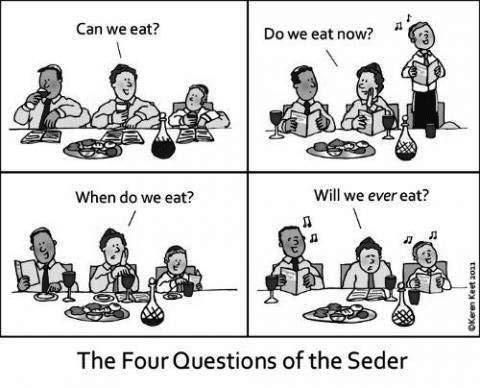
On all nights we need not dip even once, on this night we do so twice!
On all nights we eat sitting upright or reclining, and on this night we all recline!
Mah nishtanah ha-laylah hazeh mikol ha-leilot?
Sheb'chol ha-leilot anu och'lin chameitz umatzah.
Ha-laylah hazeh kulo matzah.
Sheb'chol ha-leilot anu och'lin sh'ar y'rakot.
Ha-laylah hazeh maror.
Sheb'chol ha-leilot ein anu matbilin afilu pa-am echat.Ha-laylah hazeh sh'tei f'amim.
Sheb’khol ha-leilot anu okhlim bein yoshvin uvein m’subin. Halailah hazeh kulanu m’subin.

Answer to the first question: We eat only matzah because our ancestors could not wait for their breads to rise when they were fleeing slavery in Egypt, and so they took the breads out of their ovens while they were still flat, which was matzah.
Answer to the second question: We eat only Maror, a bitter herb, to remind us of the bitterness of slavery that our ancestors endured while in Egypt.
Answer to the third question: We dip twice - (1) green vegetables in salt water, and (2) Maror in Charoset, a sweet mixture of nuts and wine. The first dip, green vegetables in salt water, symbolizes the replacing of tears with gratefulness, and the second dip, Maror in Charoset, symbolizes sweetening the burden of bitterness and suffering to lessen its pain.
Answer to the fourth question: We recline at the Seder table because in ancient times, a person who reclined at a meal symbolized a free person, free from slavery, and so we recline in our chairs at the Passover Seder table to remind ourselves of the glory of freedom.
We were slaves to Pharaoh in Egypt, and Hashem, our God, took us out from there with a strong hand and with an outstretched arm. If the Holy and Blessed One, had not taken our ancestors out of Egypt, then we, our children and our children's children would have remained enslaved to Pharaoh in Egypt. Even if all of us were wise, all of us understanding, all of us knowing the Torah, we would still be obligated to discuss the exodus from Egypt; and everyone who discusses the exodus from Egypt at length is praiseworthy.
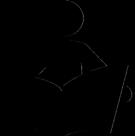

Once we were slaves in Egypt, but now we are free!
Rabbi Tarphon were reclining at a Seder in B'nei Brak. They were discussing the exodus from Egypt all that night, until their students came and told them: "Our Masters! The time has come for reciting the morning Shemah!"



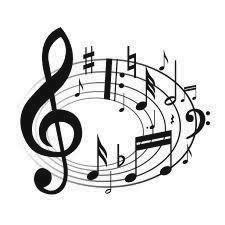
There is room to hypothesize that the account of the Seder in B'nei Brak is also a historical anecdote from some work of Midrash or work of Haggadah regarding the discussions and counsel of the great sages of Israel when they gathered in the center of nationalist zeal, B'nei Brak, the residence of Rabbi Akiva, to speak of the exodus from Egypt, the time of our freedom, and also to express ideas and arrange counsel in the matter of the movement for freedom which then enveloped the nation… All of them responded to Rabbi Akiva's call, and each came from his place to celebrate the holiday of freedom in B'nei Brak and to take counsel together in one secret Seder, without the participation of their students, regarding the appropriate and necessary role of the sages of Israel in the zealous movement which waved the flag of rebellion against Rome.
Rabbi Yehudah Leib Maimon
(1875 - 1962) Israeli Rabbi, politician and leader of the religious Zionism movement
Blessed is the Omnipresent One, blessed be God! Blessed is The One who gave the Torah to the people Israel, blessed be God!
Baruch hamakom, baruch hu. Baruch shenatan torah l'amo yisra-eil, baruch hu.


The Torah describes four children who ask questions about the Exodus. Tradition teaches that these verses refer to four different types of children.
The wise child asks, “What are the laws that God has commanded us?”
The parent should answer by instructing the child in the laws of Passover, starting from the beginning and ending with the laws of the Afikoman.
The wicked child asks, “What does this Passover service mean to you?”
The parent should answer, “It is because of what God did for me when I came out of Egypt. Specifically ‘me’ and not ‘you.’ If you had been there (with your attitude), you wouldn’t have been redeemed.”
The simple child asks, “What is this Seder service?”
The parent should answer, “With a mighty hand God brought us out of Egypt. Therefore, we commemorate that event tonight through this Seder.”
For the child who does not know how to ask. The parent should begin a discussion with that child based on the verse: “And you shall tell your child on that day, ‘We commemorate Passover tonight because of what God did for us when we went out of Egypt.’”
The Four Children. According to the Lubavitcher Rebbe of blessed memory, the wise child represents the generation of immigrants those who grew up religious in the Old World, and who brought their traditions with them into the New World. Their question is, “I want to know all about the different Mitzvot…” The wicked child represents their children, the first New World generation, who are so concerned with making it in the new society that they turn their backs on the traditions of their mothers and fathers. Their question is, “Why do you bother with the Mitzvot?” The simple child represents the grandchildren, the second generation who grow up without the benefit of religiously supportive parents, but who still have contact with their culturally distinct Bubbas and Zeidas. This generation is still capable of asking, “What is this all about?” But then there are their children, the third generation, who lose all contact with Judaism, who never see anyone lighting Shabbat candles, or putting on Tefillin. This is the generation that “doesn't even understand enough to ask a question.” This is the generation with whom we must deal today -to whom we must say, “It is because of this that Hashem did for me, when I left Egypt.”
Rabbi Alan GreenIn the beginning our ancestors served idols; but now serve the Omnipresent One, as it is said:

“Joshua said to all the people: Thus said Hashem, the God of Israel, ‘Your ancestors used to live on the other side of the river - Terach, the father of Abraham and the father of Nachor, and they served other gods’”.


This is what has stood by our ancestors and us! For not just one alone has risen against us to destroy us, but in every generation they rise against us to destroy us; and the Holy and Blessed One, saves us from their hand!

V'hi she-am'dah la-avoteinu

Go forth and learn what Laban the Aramean wanted to do to our father Jacob. Pharaoh had issued a decree against the male children only, but Laban wanted to uproot everyone - as it is said: “The Aramean wished to destroy my father; and he went down to Egypt and sojourned there, few in number; and he became there a nationgreat and mighty and numerous.”
But the Egyptians treated us badly and afflicted us, setting us to hard labour. Finally, when we cried out to Hashem, the God of our ancestors, Hashem heard our voice, saw our affliction, saw our toil and our oppression. Then Hashem brought us out from Egypt with a strong hand and an outstretched arm; with great awe, marvelous signs and with wonders.”
Blood, and fire, and pillars of smoke.
These are the Ten Plagues which the Holy and Blessed One brought upon the Egyptians, namely as follows:
Blood.
Frogs.
Lice.


Wild Beasts.
Pestilence.
Boils.
Hail.
Locust.
Darkness.
Slaying of the First-born.
Rabbi Yehuda would assign the plagues three mnemonic signs:





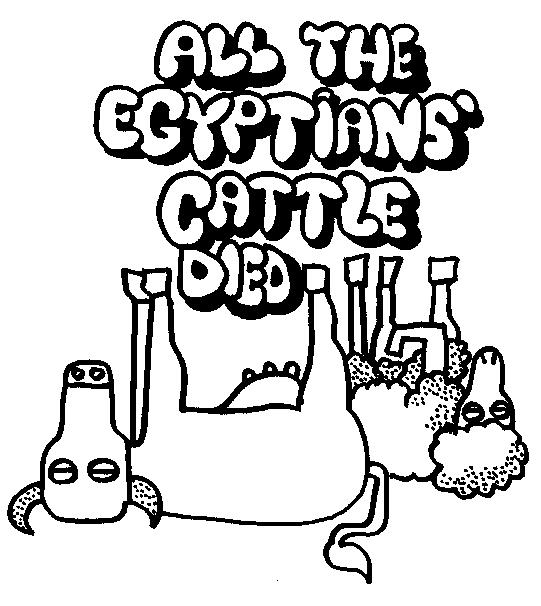





D’TZ”CH, A-Da”SH, B’AH”V.
Rabi Y'hudah hayah notein bahem simanim. D’TZ”CH, A-Da”SH, B’AH”V.
If God had brought us out from Egypt, it would have sufficed us!
If God had given us the Shabbat, it would have sufficed us!

If God had given us the Torah, it would have sufficed us!
Ilu

Dayeinu!
Ilu natan natan lanu, natan lanu et hashabat, natan lanu et hashabat Dayeinu!
Ilu natan natan lanu, natan lanu et hatorah, natan lanu et hatorah Dayeinu!
Thus how much more so should we be grateful to the Omnipresent One for the doubled and redoubled goodness bestowed upon us; for God has brought us out of Egypt, and carried out judgments against them, and against their idols, and smote their first-born, and gave us their wealth, and split the sea for us, and took us through it on dry land, and drowned our oppressors in it, and supplied our needs in the desert for forty years, and fed us the manna, and gave us the Shabbat, and brought us before Mount Sinai, and gave us the Torah, and brought us into the land of Israel and built for us the Holy Temple to atone for all our sins.
Rabban Gamliel used to say: Whoever does not discuss the following three things on Passover has not fulfilled his duty, namely: Pesach, Matzah, Maror.

Pesach - the Passover-lamb that our ancestors ate during the time of the Beit Hamikdashfor what reason did they do so?

Because the Omnipresent passed over our ancestors’ houses in Egypt, as it is said: "You shall say, It is a Passover-offering to Hashem, because God passed over the houses of the children of Israel in Egypt when God struck the Egyptians with a plague, and God saved our houses. And the people bowed and prostrated themselves."

This Matzah that we eat for what reason? Because the dough of our ancestors did not have time to become leavened before Hashem, the Holy and Blessed One, revealed the Divine Presence to them and redeemed them.

Thus it is said: “They baked Matzah-cakes from the dough that they had brought out of Egypt, because it was not leavened; for they had been driven out of Egypt and could not delay, and they had also not prepared any other provisions.”

This maror that we eat for what reason? Because the Egyptians embittered our ancestors’ lives in Egypt, as it is said:




“They made their lives bitter with hard service, with mortar and with bricks, and with all manner of service in the field; all their service which they made them serve with rigor.”
In every generation we are obligated to regard ourselves as if we had come out of Egypt.
As it is said: “You shall tell your child on that day, it is because of this that Hashem did for me when I left Egypt.”
The Holy and Blessed One redeemed not only our ancestors from Egypt, but God redeemed also us with them, as it is said: “It was us that God brought out from there, so that God might bring us to give us the land that God swore to our ancestors.”
Halleluyah.
Praise God! Offer praise, you servants of the Hashem; praise the Name of Hashem. May Hashem’s Name be blessed from now and to all eternity. From the rising of the sun to its setting, Hashem’s Name is praised.
Hashem is high above all nations, God’s glory is over the heavens. Who is like Hashem, our God, who dwells on high yet looks down so low upon heaven and earth!
God raises the poor from the dust, God lifts the needy from the dunghill, to seat them with nobles, with the nobles of God’s people. God restores the barren woman to the house, into a joyful mother of children. Halleluyah - praise God. Hal'luyah.
Hal'lu avdei Adonai, hal'lu et sheim Adonai. Y'hi sheim Adonai m'vorach, mei-atah v'ad olam. Mimizrach shemesh ad m'vo-o, m'hulal sheim Adonai.


Ram al kol goyim Adonai, al hashamayim k'vodo. Mi k'Adonai Eloheinu, hamagbihi lashavet. Hamashpili lirot, bashamayim uva-aretz.
M'kimi mei-afar dal, mei-ashpot yarim evyon. L'hoshivi im n'divim, im n'divei amo. Moshivi akeret habayit, eim habanim s'meichah, hal'luyah.
When Israel went out of Egypt, the House of Jacob from a people of a foreign language.

Judah became God’s holy one, Israel God’s dominion. The sea saw and fled, the Jordan turned backward.
The mountains skipped like rams, the hills like young sheep. What is with you, O sea, that you flee; Jordan, that you turn backward?

Mountains, why do you skip like rams; hills, like a pool of water, the flint-stone into a spring of water.
B'tzeit yisra-eil mimitzrayim, beit ya-akov mei-am loeiz.
Hay'tah y'hudah l'kod'sho, yisra-eil mamsh'lotav. Hayam ra-ah vayanos, hayardein yisov l'achor.
Heharim rak'du ch'eilim, g'va-ot kivnei tzon. Mah l'cha hayam ki tanus, hayardein tisov l'achor.
He-harim tirk'du ch'eilim, g'va-ot kivnei tzon. Milifnei adon chuli aretz, milifnei eloha ya-akov. Hahof'chi hatzur agam mayim, chalamish l'may'no mayim.
We praise You, Eternal God, Sovereign of the universe, who has redeemed us and redeemed our ancestors from Egypt, and enabled us to attain this night to eat matzah and maror. So too, God, our God and God of our ancestors, enable us to attain other holidays and festivals that will come to us in peace with happiness in the rebuilding of Your city, and with rejoicing in Your service in the Holy Temple. Then we shall eat of the sacrifices and of the Passoverofferings whose blood shall be sprinkled on the wall of Your altar for acceptance; and we shall thank You with a new song for our redemption and for the deliverance of our souls. We praise You, Eternal God, who redeemed Israel.
We praise You, Eternal God, Sovereign of the universe, who creates the fruit of the vine.
Baruch atah Adonai, Eloheinu melech ha-olam, asher g'alanu v'ga-al et avoteinu mimitzrayim, v'higi-anu l’lalaylah hazeh, le-echol bo matzah u-maror. Kein, Adonai Eloheinu veilohei avoteinu, yagi-einu l'moadim v'lirgalim acheirim, ha-ba-im likrateinu l'shalom. S'meichim b'vinyan irecha, v'sasim ba-avodatecha, v'nochal sham min haz'vachim umin hap'sachim, asher yagi-a damam, al kir mizbachacha l'ratzon, v'nodeh l'cha shir chadash al g'ulateinu, v'al p'dut nafsheinu. Baruch atah Adonai, ga -al yisra-eil.

Baruch atah Adonai, Eloheinu melech ha-olam, borei p'ri hagafen.

Now the hands are washed with recital of the blessing for washing the hands.
We praise You, Eternal God, Sovereign of the universe, who has sanctified us with Your commandments and commanded us concerning the washing of the hands.
Take the Matzot in the order that they are lying on the tray - the broken piece between the two whole Matzot; hold them in your hand and recite the following blessing:

We praise You, Eternal God, Sovereign of the universe, who brings forth bread from the earth.

Baruch atah Adonai, Eloheinu melech ha-olam, hamotzi lechem min ha-aretz.

We praise You, Eternal God, Sovereign of the universe, who has sanctified us with Your commandments and commanded us concerning the eating of Matzah.



We praise You, Eternal God, Sovereign of the universe, who has sanctified us with Your commandments and commanded us concerning the eating of Maror.

Take the third Matzah, and also a kezayit (the volume of one olive) of the Chazeret (Bitter Vegetable used in addition to the Maror) - which is to be dipped into Charoset. Combine the two like a sandwich, and say the following:



Thus did Hillel do at the time of the Holy Temple: He would combine Passover lamb, Matzah and Maror and eat them together, as it said: “They shall eat it with Matzah and bitter herbs.”


After the meal, take the Afikoman and divide it among all the members of the household, by giving everyone a kezayit (the volume of one olive).

Take care not to eat or drink after the Afikoman, except for the two remaining mandatory ritual cups of wine, one for the Grace after meals and one for Hallel.

It is to be eaten in the reclining position and this ought to be done before midnight.
A Song of Ascents. When Hashem will return the exiles of Zion, we will have been like dreamers. Then our mouth will be filled with laughter, and our tongue with joyous song. Then will they say among the nations, “Hashem has done great things for these.” Hashem has done great things for us, we were joyful. Hashem, return our exiles as streams in the Negev. Those who sow in tears will reap with joyous song. Those who go along weeping, carrying the bag of seed; will surely come back with joyous song, carrying their sheaves.
Shir ha-ma’alot b’shuv Adonai et sheevat Tziyon hayinu keholmim. As y’malel sehok pinu ul’shonenu rina. As yomru vagoyim higdil Adonai la-asot im eileh, higdil Adonai la-asot imanu hayinu semeihim. Shuva Adonai et sheviteinu ka-afikim baNegev. Hazorim bedimah berinah yiktzoru. Halokh yelekh uvakho, nosei meshekh hazarah, bo yavo v’rinah nosei alumatav.

Leader:
Let us say Grace!
Everyone:
May the Name of Hashem be blessed from now and forever.
Leader: May the Name of Hashem be blessed from now and forever.

With the permission of the masters, teachers and guests, let us bless our God, whose bounty we have eaten.
Everyone:
Blessed be our God, of whose bounty we have eaten.
Leader: Blessed be our God, of whose bounty we have eaten.
Blessed be our God and praised be God’s Name always, forever and ever.
Leader: Rabotai n’varech.
Everyone:
Y’hi sheim Adonai m’vorach mei-ata v’ad olam.
Leader:
Y’hi sheim Adonai m’vorach mei-ata v’ad olam.
Birshut maran v’raban v’rabotai n’vareich Eloheinu she-achalnu mee-shelo.
Everyone:
Baruch Eloheinu she-achalnu mee-shelo uv’tuvo chayinu.
Leader:
Baruch Eloheinu she-achalnu mee-shelo uv’tuvo chayinu.
Baruch hu uvaruch sh’mo.
We praise You, Eternal God, Sovereign of the universe, who, in goodness, feeds the whole world with grace, with kindness and with mercy. God gives food to all flesh, for God’s kindness is everlasting. Through God great goodness to us continuously we do not lack food, and may we never lack it, for the sake of God’s great Name. For God is a benevolent God who feeds and sustains all, does good to all, and prepares food for all the creatures whom God has created, as it is said: You open Your hand and satisfy the desire of every living thing. We praise You, Eternal God, who provides food for all.
Baruch ata Adonai Eloheinu melech haolam, hazal et haolam kulo b’tuvo b’chein b’chesed uv’rachamim, hu notein lehem l’chol vasar kee l’olam hasdo. uv’tuvo hagadol, tamid lo chasar lanu, v’al yehsar lanu mazon l’olam vaed. Ba’avur sh’mo hagadol, kee hu El zan um’farnei lakol umei-tiv lakol, umeichin mazon k’chol b’riyotav asher bara, Baruch atah Adonai, hazan et hakol.
We thank You, eternal God, for having given as a heritage to our ancestors a precious, good and spacious land, for the covenant and Torah, for life and sustenance. May Your Name be blessed by the mouth of every living being, constantly and forever. As it is written: When you have eaten and are satiated, you shall bless Hashem your God, for the good land which God has given you. We praise You, Eternal God, for the land and for the food.
Nodeh l’cha
On Shabbat add:
May it please You, Hashem, our God, to strengthen us through Your commandments, and through the precept of the Seventh Day, this great and holy Shabbat. For this day is great and holy before You, to refrain from work and to rest thereon with love, in accordance with the commandment of Your will. In Your will, Hashem, our God, bestow upon us tranquility, that there shall be no trouble, sadness or grief on the day of our rest. Hashem, our God, let us see the consolation of Zion Your city, and the rebuilding of Jerusalem Your holy city, for You are the Master of all salvations and the Master of all consolations.
v’ha-chalitzenu Adonai Eloheinu b’mitzvotecha, u-v’mitzvat yom ha-sh’vi-i, ha-Shabbat ha-gadol v’ha-kadosh ha-zeh. Ki yom zeh gadol v’kadosh hu l’fanecha, lishbot bo v’lanu-ach bo, b’ahavah k’mitzvat anachah b’yom

Our God and God of our ancestors, may there ascend, come and reach, be seen and accepted, heard, recalled and remembered before You, the remembrance and recollection of us, the remembrance of our ancestors, the remembrance of Messiah the son of David Your servant, the remembrance of Jerusalem Your holy city, and the remembrance of all Your people the House of Israel, for deliverance, well-being, grace, kindness, mercy, good life and peace, on this day of the Festival of Matzot, on this Festival of holy convocation. Remember us on this day, Hashem, our God, for good; recollect us on this day for blessing; help us on this day for good life. With the promise of deliverance and compassion, spare us and be gracious to us; have mercy upon us and deliver us; for our eyes are directed to You, for You, God, are a gracious and merciful Ruler.
Eloheinu veilohei avoteinu, yaleh v’yavo v’yagiah, v’yei-ra-eh, v’yei-ratzeh, v’yishma, v’yipakeid, v’yizacheir zichroneinu ufik-doneinu, v’zichron avoteinu, v’zichron mashiach be david avdecha, v’zichron y’rushalayim ir kod-shecha, v’zichron kol amcha beit yisrael l’fanecha, lifleita l’tova l’chein ul’chesed ul’rachamim, l’chayim ul’shalom b’yom chag ha-matzot hazeh. Zochreinu Adonai Eloheinu bo l’tova, ufokdeinu vo livracha v’hoshi-einu vo l’chayim,uv’d-var y’shu-ah v’rachamim, chus v’cha-neinu, v’racheim aleinu v’hoshi-einu ki ei-lecha eineinu, ki eil melech chanun vrachum ata.
Rebuild Jerusalem the holy city speedily in our days. We praise You, Eternal God, who with mercy rebuilds Jerusalem. Amen.
U-v’nei Y’rushalayim ir ha-kodesh bi-m’herah v’yameinu. Baruch atah Adonai, boneh v’rahamav Y’rushalayim. Amen
שֶׁדֵֹֽקַּה ריִע םִיֵַֽלָשׁוּרְי הנְבוּ
We praise You, Eternal God, Sovereign of the universe, benevolent God, who is good and does good to all, each and every day. God has done good for us, God does good for us, and God will do good for us; God has bestowed, God bestows, and God will forever bestow upon us grace, kindness and mercy. May we be worthy of the days of the Messiah.
Baruch atah Adonai Eloheinu melech ha-olam, ha-melech ha-tov v’ha-metiv la-kol, she-b’chol yom va-yom.
Hu hetiv, Hu metiv, Hu yeitiv lanu. Hu g’malanu, Hu gomlenu, Hu yigm’lenu la-ad chen va-chesed v’rachamim, vizakeinu limot ha-Mashiach.
On Shabbat add:
May the Merciful One cause us to inherit that day which will be all Shabbat and rest for life everlasting.
Ha-rachaman, hu yanchilenu yom she-kulo Shabbat u-m’nuchah, l’chayei ha-olamim.
May the Merciful One cause us to inherit that day which is all good.
May the Merciful One bless all our people who suffer and bring them out of darkness into light.
May the Merciful One bless the State of Israel, the dawn of our redemption.
Ha-rachaman, Hu yanchilenu yom she-kulo tov.
Ha-rachaman, Hu yevarech et-acheinu b’nei Israel ha-netunim b’tzarah, v’yotziem me-afeilah l’orah.
Ha-rachaman, Hu yevarech et-Medinat Israel, reshit tz’michat geulateinu.
May we receive blessings from Hashem, lovingkindness from the God of our deliverance. May we find grace and good favor before God and all people. May God who brings peace to the universe bring peace to us, to all the people Israel. And let us say: Amen.
V’nisa verachah m’et Adonai, u-tzedakah m’Elohei yisheinu, v’nimtza chen v’sechel tov b’einei Elohim v’adam. Oseh Shalom bimromav, Hu yaase Shalom, aleinu v’al kol Israel, v’imeru Amen.
We praise You, Eternal God, Sovereign of the universe, who creates the fruit of the vine.

Baruch atah Adonai, Eloheinu melech ha-olam, borei p'ri hagafen

Elijah, the Prophet; Elijah, the Tishbite; Elijah, the Gileadite;
May he soon come and bring the Messiah.
Eliyahu Ha-navi, Eliyahu Ha-tish-bi
Eliyahu, Eliyahu, Eliyahu Ha-giladi.
Bim Heira B’yameinu, Yavo eileinu, Yim mashiach ben David, Yim mashiach ben David.

Hashem, mindful of us, will bless. God will bless the House of Israel; God will bless the House of Aaron; God will bless those who fear Hashem, the small with the great. May Hashem increase blessing upon you, upon you and upon your children. You are blessed unto Hashem, the Maker of heaven and earth. The heavens are the heavens of Hashem, but the earth God gave to us. The dead do not praise God, nor do those that go down into the silence of the grave. But we will bless God, from now to eternity. Halleluyah. Praise God.
Adonai z'charanu y'vareich, y'vareich et beit yisra-eil, y'vareich et beit aharon. Y'vareich yirei Adonai, hak'tanim im hag'dolim. Yoseif Adonai aleichem, aleichem v'al b'neichem. B'ruchim atem l'Adonai, oseih shamayim va-aretz. Hashamayim shamayim l'Adonai, v'ha-aretz natan livnei adam. Lo hameitim y'hal'lu yah, v'lo kol yor'dei dumah. Va-anachnu n'vareich Yah, mei-atah v'ad olam, hal'luyah.

For it is good to give thanks to You, and fitting to sing praises to Your name. You are God throughout all eternity. We praise You, Eternal God, Sovereign exalted by praise.
Ko lecha tov l’hodot ul’shimcha na’e l’zamer. Ki meolam v’ad olam atah El. Baruch atah Adonai, Melech mehulal batish’bachot.

We praise You, Eternal God, Sovereign of the universe, who creates the fruit of the vine.
Baruch atah Adonai, Eloheinu melech ha-olam, borei p'ri hagafen
We praise You, Eternal God, Sovereign of the universe, for the vine and the fruit of the vine, for the produce of the field, and for the precious, good and spacious land which You have favored to give as an heritage to our ancestors, to eat of its fruit and be satiated by its goodness. Have mercy, Hashem our God, on Israel Your people, on Jerusalem Your city, on Zion the abode of Your glory, on Your altar and on Your Temple. Rebuild Jerusalem, the holy city, speedily in our days, and bring us up into it, and make us rejoice in it, and we will bless You in holiness and purity (On Shabbat add: May it please You to strengthen us on this Shabbat day) and remember us for good on this day of the Festival of Matzot. For You, Hashem, are good and do good to all, and we thank You for the land and for the fruit of the vine. We praise You, Eternal God, for the land and for the fruit of the vine.
Baruch atah Adonai Eloheinu melech ha-olam, al hagefen v'al p'ri hagefen. V'al t'nuvat hasadeh, v'al eretz chemdah tovah ur'chavah, sheratzita v'hinchalta la-avoteinu, le-echol mipiryah v'lisboa mituvah. Rachem na, Adonai Eloheinu, al yisra-eil amecha, v'al y'rushalayim irecha, v'al tzion mishkan k'vodecha, v'al mizb'checha, v'al heicholecha. Uv'neih y'rushalayim ir hakodesh bimheirah v'yameinu, v'ha-aleinu l'tochah, v'sam'cheinu b'vinyanah, v'nochol mipiryah v'nisba mituvah, un'varechcha aleha bikdushah uv'tahorah. (On Shabbat add: ur'tzeih v'hachalitzeinu b'yom hashabat hazeh.) V'sam'cheinu b'yom chag hamatzot hazeh. Ki atah Adonai tov umeitiv lakol, v'nodeh l'cha al ha-aretz v’al p'ri hagafen. Baruch atah Adonai, al ha-aretz v’al p'ri hagafen.


Echad Mi yodeah?
Echad Mi yodeah? Echad ani yodeah!

Echad eloheynu, Eloheinu (x4) shebashamayim uva'aretz.

Shenayim mi yodeah? Shenayim ani yodeah!
Sheney luchot habrit, Echad eloheynu, Eloheinu (x4) shebashamayim uva'aretz.
Sheloshah mi yodeah? Sheloshah ani yodeah!
Sheloshah avot, sheney luchot habrit, Echad eloheynu, Eloheinu (x4) shebashamayim uva'aretz.
Arba mi yodeah? Arba ani yodeah! Arba imahot, sheloshah avot, sheney luchot habrit, Echad eloheynu, Eloheinu (x4) shebashamayim uva'aretz.
Chamishah mi yodeah? Chamishah ani yodeah! Chamishah chumshey Torah, arba imahot, sheloshah avot, sheney luchot habrit, Echad eloheynu,
Eloheinu (x4) shebashamayim uva'aretz.
Shishah mi yodeah? Shishah ani yodeah! Shishah
sidrey Mishnah, chamishah chumshey Torah, arba imahot, sheloshah avot, sheney luchot habrit, Echad eloheynu, Eloheinu (x4) shebashamayim uva'aretz.
Shivah mi yodeah? Shivah ani yodeah! Shivah yemey shabata, shishah sidrey Mishnah, chamishah chumshey Torah, arba imahot, sheloshah avot, sheney luchot habrit, Echad eloheynu, Eloheinu (x4) shebashamayim uva'aretz.
Shemonah rni yodeah? Shemonah ani yodeah! Shemonah vemey milah, shivah yemey shabata, shishah sidrey Mishnah, chamishah chumshey Torah, arba imahot, sheloshah avot, sheney luchot habrit, Echad eloheynu,
Eloheinu (x4) shebashamayim uva'aretz.
Tishah mi yodeah? Tishah ani yodeah! Tishah yarchey ledah, shemonah vemey milah, shivah yemey shabata, shishah sidrey Mishnah, chamishah chumshey Torah, arba imahot, sheloshah avot, sheney luchot habrit, Echad eloheynu,
Eloheinu (x4) shebashamayim uva'aretz.
Asarah mi yodeah? Asarah ani yodeah! Asarah dibraya, tishah yarchey ledah, shemonah vemey milah, shivah yemey shabata, shishah sidrey Mishnah, chamishah chumshey Torah, arba imahot, sheloshah avot, sheney luchot habrit, Echad eloheynu,
Eloheinu (x4) shebashamayim uva'aretz.
Achad asar mi yodeah? Achad asar ani yodeah!
Achad asar kochvaya, asarah dibraya, tishah yarchey ledah, shemonah vemey milah, shivah yemey shabata, shishah sidrey Mishnah, chamishah chumshey Torah, arba imahot, sheloshah avot, sheney luchot habrit, Echad eloheynu,
Eloheinu (x4) shebashamayim uva'aretz.
Sheneym asar mi yodeah? Sheneyrn asar ani yodeah! Sheneym asar shivtaya, achad asar kochvaya, asarah dibraya, tishah yarchey ledah, shemonah vemey milah, shivah yemey shabata, shishah sidrey Mishnah, chamishah chumshey Torah, arba imahot, sheloshah avot, sheney luchot habrit, Echad eloheynu, Eloheinu (x4) shebashamayim uva'aretz.
Sheloshah asar mi yodeah? Sheloshah asar ani yodeah! Sheloshah asar rnidayah, sheneym asar shivtaya, achad asar kochvaya, asarah dibraya, tishah yarchey ledah, shemonah vemey milah, shivah yemey shabata, shishah sidrey Mishnah, chamishah chumshey Torah, arba imahot, sheloshah avot, sheney luchot habrit, Echad eloheynu, Eloheinu (x4) shebashamayim uva'aretz.
Who knows one? I know one! One is our God in Heaven and on Earth.
Who knows two? I know two! Two are the tablets of the covenant. One is our G-d, in Heaven and on Earth.
Who knows three? I know three! Three are our patriarchs…
Who knows four? I know four! Four are our matriarchs…
Who knows five? I know five! Five are the books of the Torah…
Who knows six? I know six! Six are the orders of the Mishnah…
Who knows seven? I know seven! Seven are the days of the week…
Who knows eight? I know eight! Eight are the days to circumcision…
Who knows nine? I know nine! Nine are the months to childbirth…
Who knows ten? I know ten! Ten are the commandments of Sinai!...
Who knows eleven? I know eleven! Eleven are the stars of Joseph's dream…
Who knows twelve? I know twelve! Twelve are the tribes of Israel!...
Who knows thirteen? I know thirteen! Thirteen are the attributes of God...
Chad gadya chad gadya.
Dezavin aba bitrey zuzey, chad gadya chad gadya.
V'ata shunra v'achla l’gadya, Dezavin aba bitrey zuzey, chad gadya chad gadya.
Va'ata chalba, v’nashach l’shunra, d’achlah l’gadya,
Dezavin aba bitrey zuzey, chad gadya chad gadya.
V’atah chutra, v’hikah l’chalba, d’nashach l’shunra, d’achlah l’gadya,

Dezavin aba bitrey zuzey, chad gadya chad gadya.
V’ata nura, v’saraf l’chutra, d’hikah l’chalba, d’nashach l’shunra, d’achlah l’gadya,
Dezavin aba bitrey zuzey, chad gadya chad gadya.
V’ata maya v’chavah lenura, d’saraf l’chutra, d’hikah lechalba, d’nashach leshunra, d’achlah l’gadya,
Dezavin aba bitrey zuzey, chad gadya chad gadya.

Va'ata tora v’shatah lemaya, d’chavah lenura, d’saraf l’chutra, d’hikah l’chalba, d’nashach l’shunra, d’achlah l’gadya,
Dezavin aba bitrey zuzey, chad gadya chad gadya.
V’ata hashochet v’shachat l’tora, d’shatah lemaya, d’chavah lenura, d’saraf l’chutra, d’hikah l’chalba, d’nashach l’shunra, d’achlah l’gadya,
Dezavin aba bitrey zuzey, chad gadya chad gadya.
V’ata malach hamavet v’shachat l’shochet, d’shachat l’tora, d’shatah lemaya, d’chavah lenura, d’saraf l’chutra, d’hikah l’chalba, d’nashach l’shunra, d’achlah l’gadya,
Dezavin aba bitrey zuzey, chad gadya chad gadya.
V’ata haKadosh Baruch Hu v’shachat l’malach hamavet, d’shachat l’shochet, d’shachat l’tora, d’shatah lemaya, d’chavah lenura, d’saraf l’chutra, d’hikah l’chalba, d’nashach l’shunra, d’achlah l’gadya, Dezavin aba bitrey zuzey, chad gadya chad gadya.
An only kid, an only kid.
My father bought for two zuzim, an only kid, an only kid. Then came a cat and ate the kid.
My father bought for two zuzim, an only kid, an only kid. Then came a dog and bit the cat that ate the kid.
My father bought for two zuzim, an only kid, an only kid. Then came a stick and beat the dog that bit the cat that ate the kid.
My father bought for two zuzim, an only kid, an only kid. Then came a fire and burnt the stick that beat the dog, that bit the cat that ate the kid.
My father bought for two zuzim, an only kid, an only kid. Then came water and quenched the fire that burnt the stick, that beat the dog that bit the cat that ate the kid.
My father bought for two zuzim, an only kid, an only kid. Then came an ox and drank the water that quenched the fire, that burnt the stick that beat the dog, that bit the cat that ate the kid.
My father bought for two zuzim, an only kid, an only kid. Then came a slaughterer and killed the ox that drank the water, that quenched the fire that burnt the stick that beat the dog, that bit the cat that ate the kid.

My father bought for two only kid, an only kid.
Then came the angel of death who killed the slaughterer, who killed the ox that drank the water, that quenched the fire that burnt the stick that beat the dog, that bit the cat that ate the kid.
My father bought for two only kid, an only kid.
Then came the Holy One and killed the angel of death, who killed the slaughterer, who killed the ox that drank the water, that quenched the fire that burnt the stick that beat the dog, that bit the cat that ate the kid.
My father bought for two only kid, an only kid.
At the second Seder, we begin the count of seven weeks from Pesach to the festival of Shavuot.
We are about to fulfill the Mitzvah of counting the Omer, as it is written in the Torah: “You shall count from the day following the day of rest, from the day that you brought an Omer of grain as an offering, seven full weeks shall be counted; you shall count fifty days to the day following the seventh week” (Leviticus 23:15-16)
Hineni muchan um’zuman lekayem mitzvat haseh shel S’firat haOmer, k’mo shekatuv baTorah: “usefartem lachem mimochorat haShabat miyom haviachem et Omer hatenufah, sheva Shabatot temimot tihyena. Ad mimochorat haShabat hasheviyt tisperu chamishim yom.
We praise You, Eternal God, Sovereign of the universe, who has sanctified us with Your commandments and commanded us counting the Omer.
Today is the first day of the Omer.

Baruch atah Adonai, Eloheinu melech ha-olam, asher kid'shanu b'mitzvotav v'tzivanu al Sefirat HaOmer. Hayom yom echad laOmer.

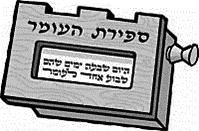
The Passover Seder is concluded, according to each traditional detail with all its laws and customs. As we have been privileged to celebrate this Seder, so may we one day celebrate it in Jerusalem. Pure One who dwells in the high places, support your People countless in number. May you soon redeem all your People joyfully in Zion.
NEXT YEAR IN JERUSALEM!










1) “The Ten Commandments” (1956)

2) “The Prince of Egypt” (1998)
3) “The Ten Commandments: The Musical” (2004)
4) “The Ten Commandments” (2007)
5) “Exodus: Gods and Kings” (2014)
Find the right answers on the last page

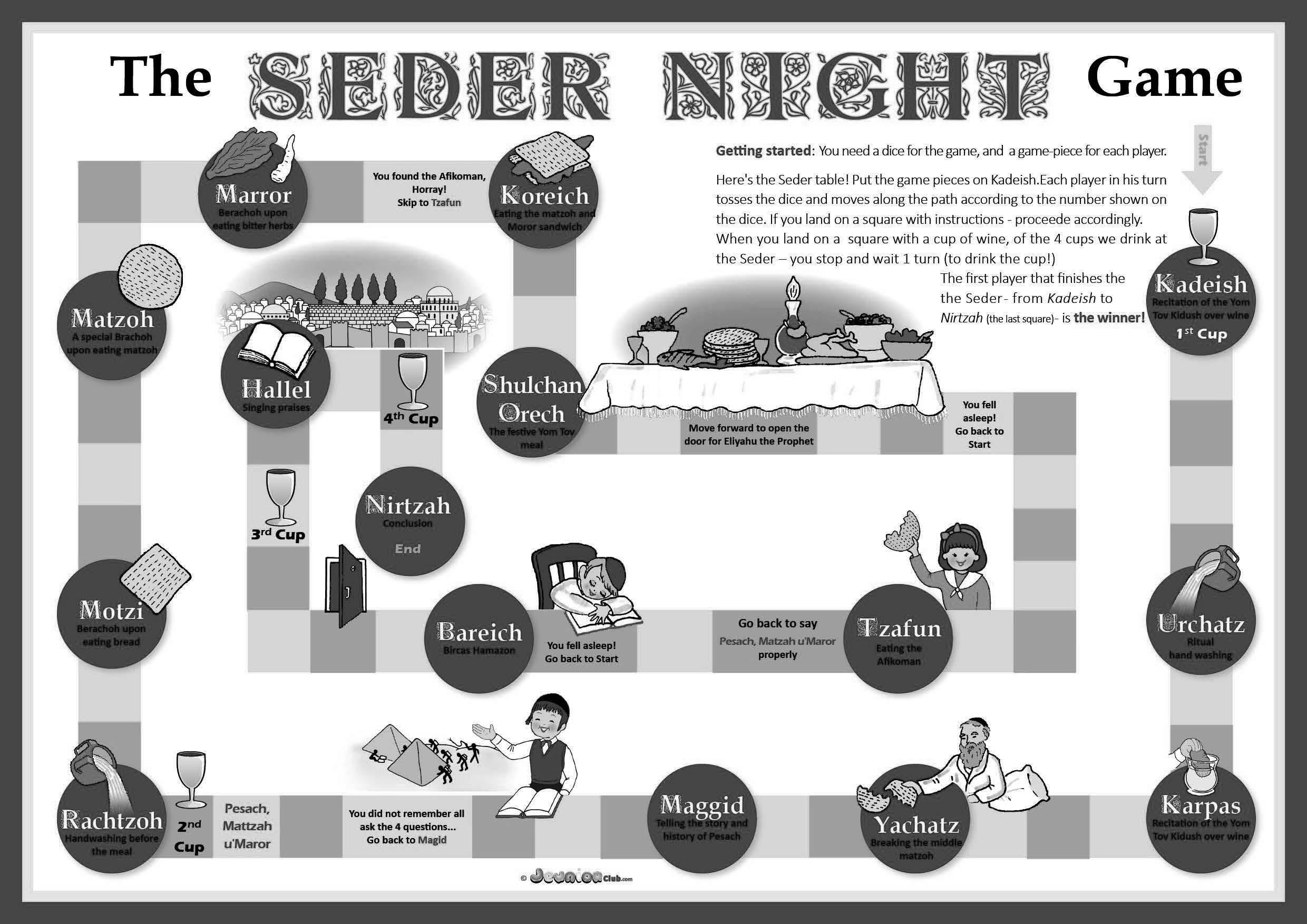


What is the Pesach?
How many cups of wine are required by the Haggadah?
What body of water did Moses lead the Israelites through?
Assiniboine Black Sea
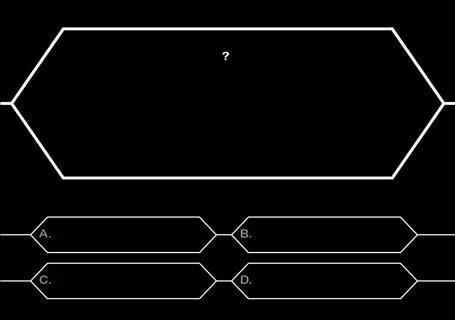





Sea of Reeds Dead Sea
What arre the only ingredients allowed in matzah?
Juice and Flour Water and Flour
Wine and Rice Wine and Fruit
What month is Pesach celebrated in?
What is the maximum number of minutes matzah can be baked?
What t is the Hebrew word for “Egypt”?





How many Hebrew souls went down to Egypt?
How many Israelites (Men, aged 18 - 60) left Egypt?
What do we begin counting the second night of Pesach?



